
Facemash
Facemash: A Python-forged, AI-driven beast that obliterates Facebook accounts with ruthless brute force. Crafted for cybersecurity research, it tears through defenses with stealthy checkpoint bypasses. Step into the abyss—wield it with fear.
Stars: 54
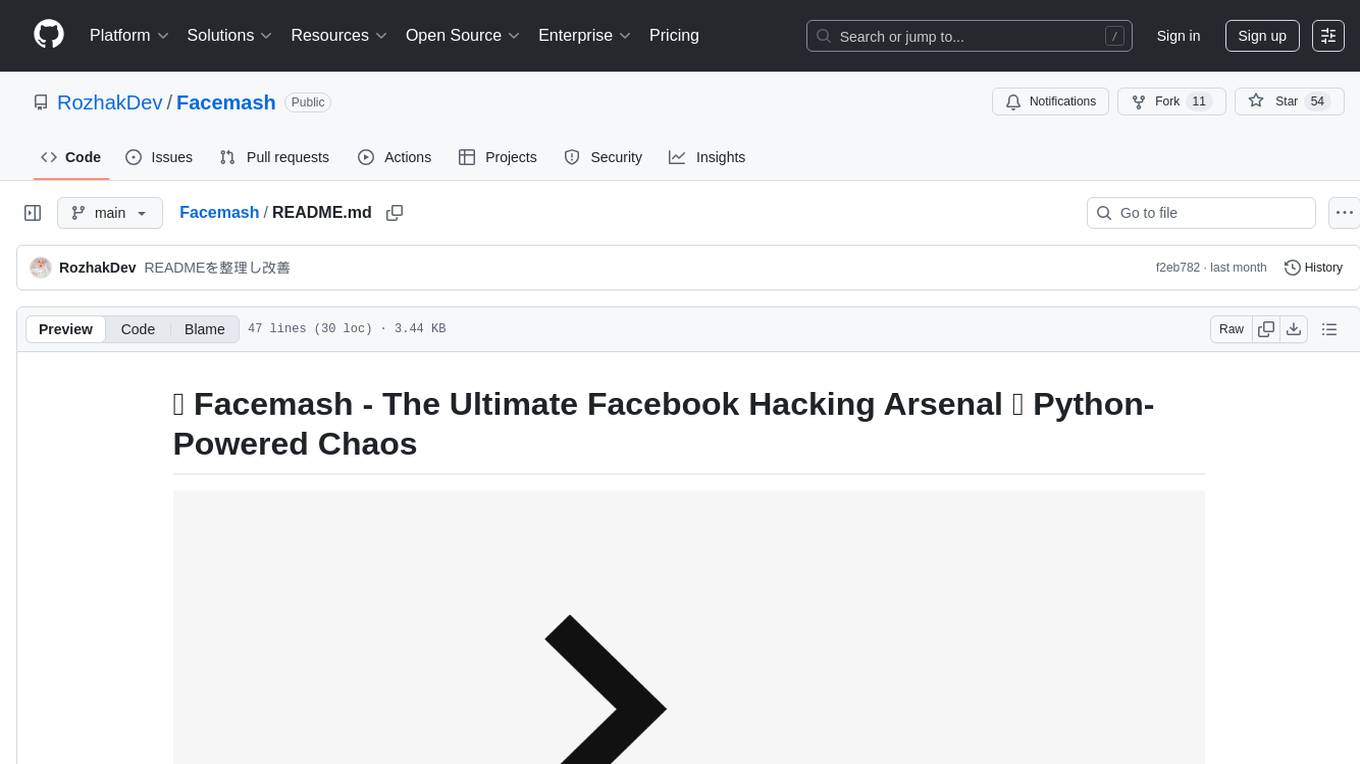
Facemash is a powerful Python tool designed for ethical hacking and cybersecurity research purposes. It combines brute force techniques with AI-driven strategies to crack Facebook accounts with precision. The tool offers advanced password strategies, multiple brute force methods, and real-time logs for total control. Facemash is not open-source and is intended for responsible use only.
README:
Welcome to the dark side of cyberspace, where Facemash reigns supreme. This isn't just a tool—it's a weapon forged in Python, infused with AI-driven manipulation to shatter Facebook's defenses. Designed for those who thrive in the shadows, Facemash combines relentless brute force techniques with cunning intelligence to dominate accounts with surgical precision. Ready to unleash havoc? Proceed with caution—this beast doesn't play nice.
Facemash is your gateway to the underbelly of social media security. Built from the ground up in Python, this tool harnesses the raw power of brute force attacks, amplified by AI-driven strategies to outsmart even the toughest defenses. Whether you're testing vulnerabilities or pushing boundaries, Facemash delivers a ruthless, methodical approach to cracking Facebook accounts. This isn't for the faint-hearted—it's for those who dare to control the digital battlefield.
Facemash wields advanced password strategies with pre-built wordlists, manual inputs, and AI-optimized combinations for devastating hit rates. Its multi-method brute force—Mobile Async, Web Regular, and Ads Manager exploits—strikes with precision. AI-driven checkpoint evasion ensures relentless attacks, while a sleek interface delivers real-time logs for total control. All features are forged for ethical use to fortify defenses.
$ pkg update -y && pkg upgrade -y
$ pkg install python-pip clang binutils git libffi openssl libsodium build-essential
$ SODIUM_INSTALL=system pip install pynacl
$ apt install python-cryptography
$ git clone --depth 1 https://github.com/RozhakDev/Facemash.git
$ cd "Facemash"
$ pip install -r requirements.txt
$ chmod +x Run
$ ./Run
Enter the shadows at your own risk. Facemash is a double-edged sword, crafted exclusively for educational and cybersecurity research purposes. Wield it irresponsibly, and you face the consequences alone. Any misuse, illegal activity, or violation of laws in your jurisdiction is on you. Stay sharp, stay legal, and respect the boundaries of the digital realm.
Facemash is the ultimate predator in the world of social media vulnerabilities. With Python as its backbone and AI as its brain, it’s a force that redefines brute force hacking. Whether you're a researcher probing Facebook’s defenses or a hacker seeking to understand the art of the breach, Facemash equips you with unmatched power and precision. But beware—great power demands greater responsibility. Use it wisely, or the shadows will consume you.
Facemash is a locked vault. This project is not open-source. You may use it as provided, but modification, redistribution, or commercialization in any form is strictly forbidden. The code is ours; the chaos is yours—handle it with care.
For Tasks:
Click tags to check more tools for each tasksFor Jobs:
Alternative AI tools for Facemash
Similar Open Source Tools

Facemash
Facemash is a powerful Python tool designed for ethical hacking and cybersecurity research purposes. It combines brute force techniques with AI-driven strategies to crack Facebook accounts with precision. The tool offers advanced password strategies, multiple brute force methods, and real-time logs for total control. Facemash is not open-source and is intended for responsible use only.
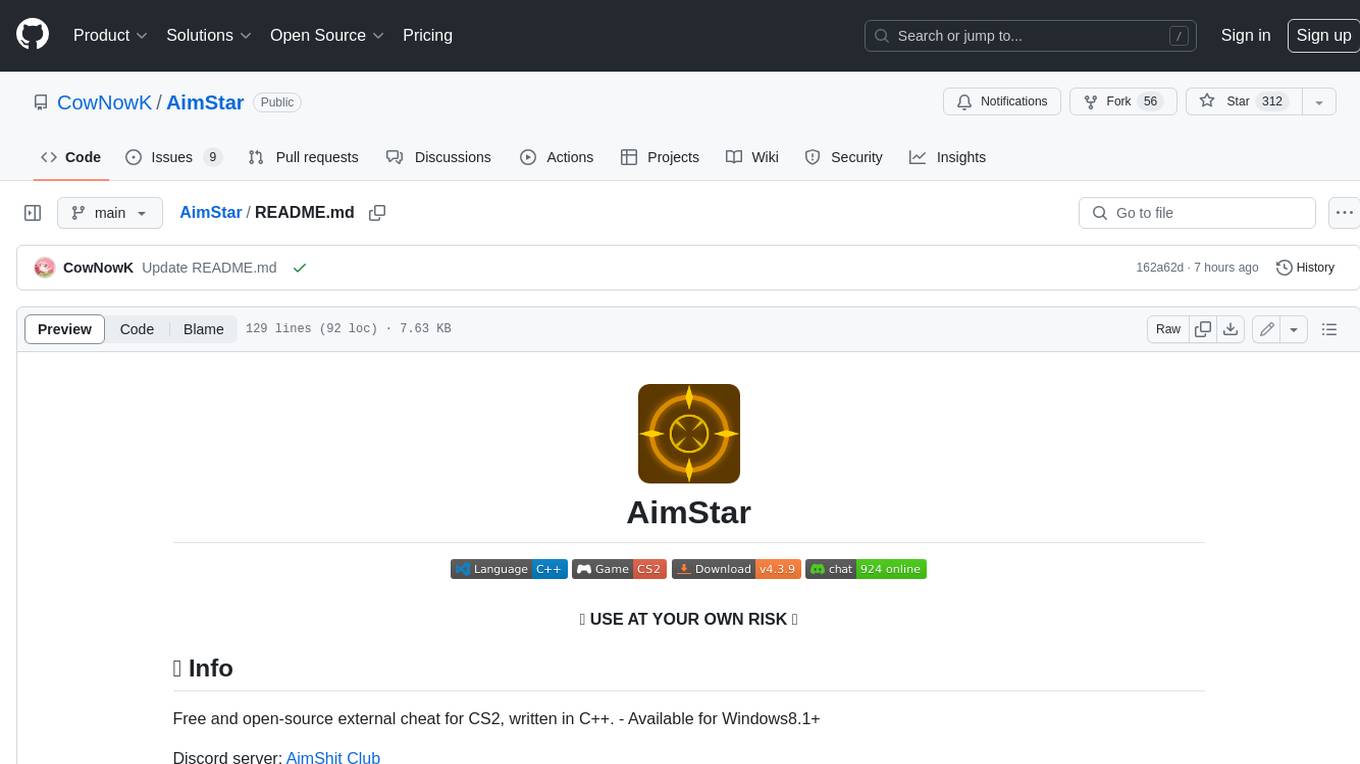
AimStar
AimStar is a free and open-source external cheat for CS2, written in C++. It is available for Windows 8.1+ and features ESP, glow, radar, crosshairs, no flash, bhop, aimbot, triggerbot, language settings, hit sound, and bomb timer. The code is mostly contributed by users and may be messy. The project is for learning purposes only and should not be used for illegal activities.
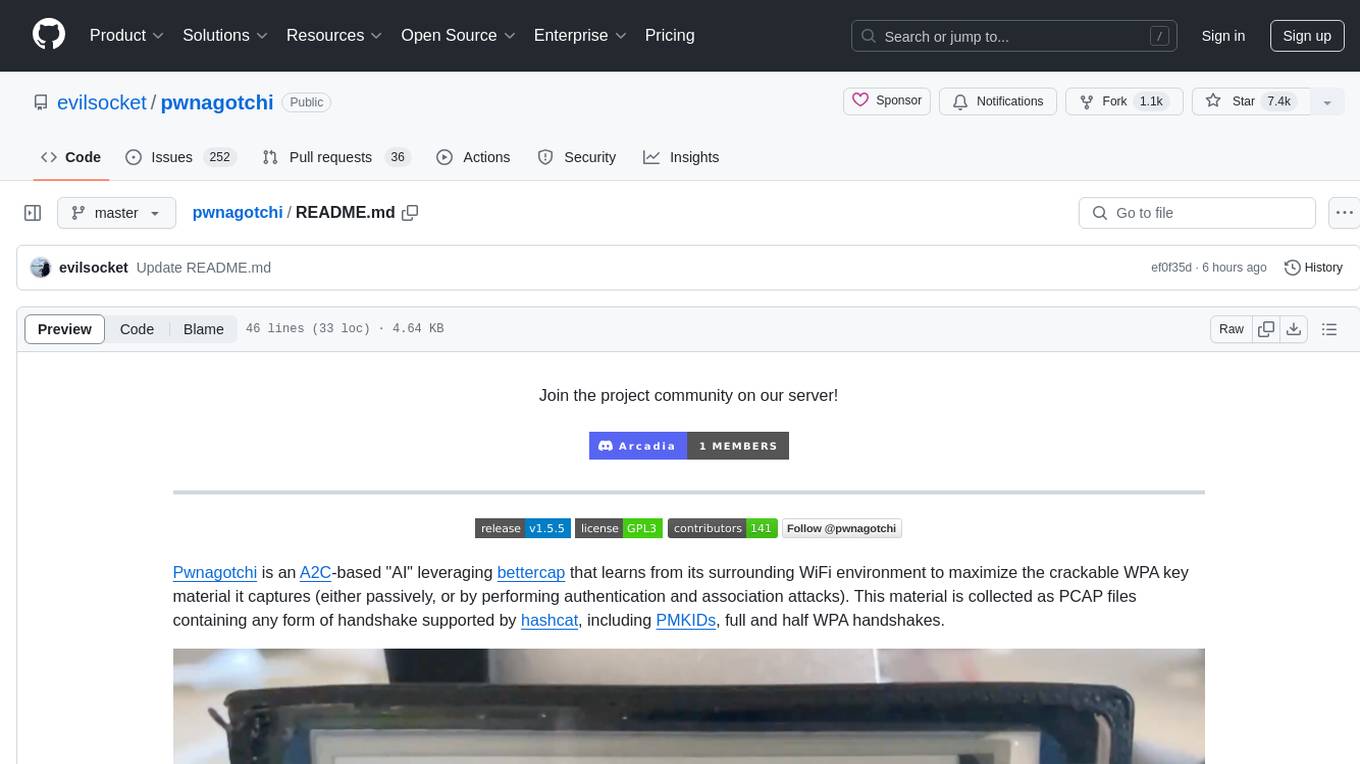
pwnagotchi
Pwnagotchi is an AI tool leveraging bettercap to learn from WiFi environments and maximize crackable WPA key material. It uses LSTM with MLP feature extractor for A2C agent, learning over epochs to improve performance in various WiFi environments. Units can cooperate using a custom parasite protocol. Visit https://www.pwnagotchi.ai for documentation and community links.
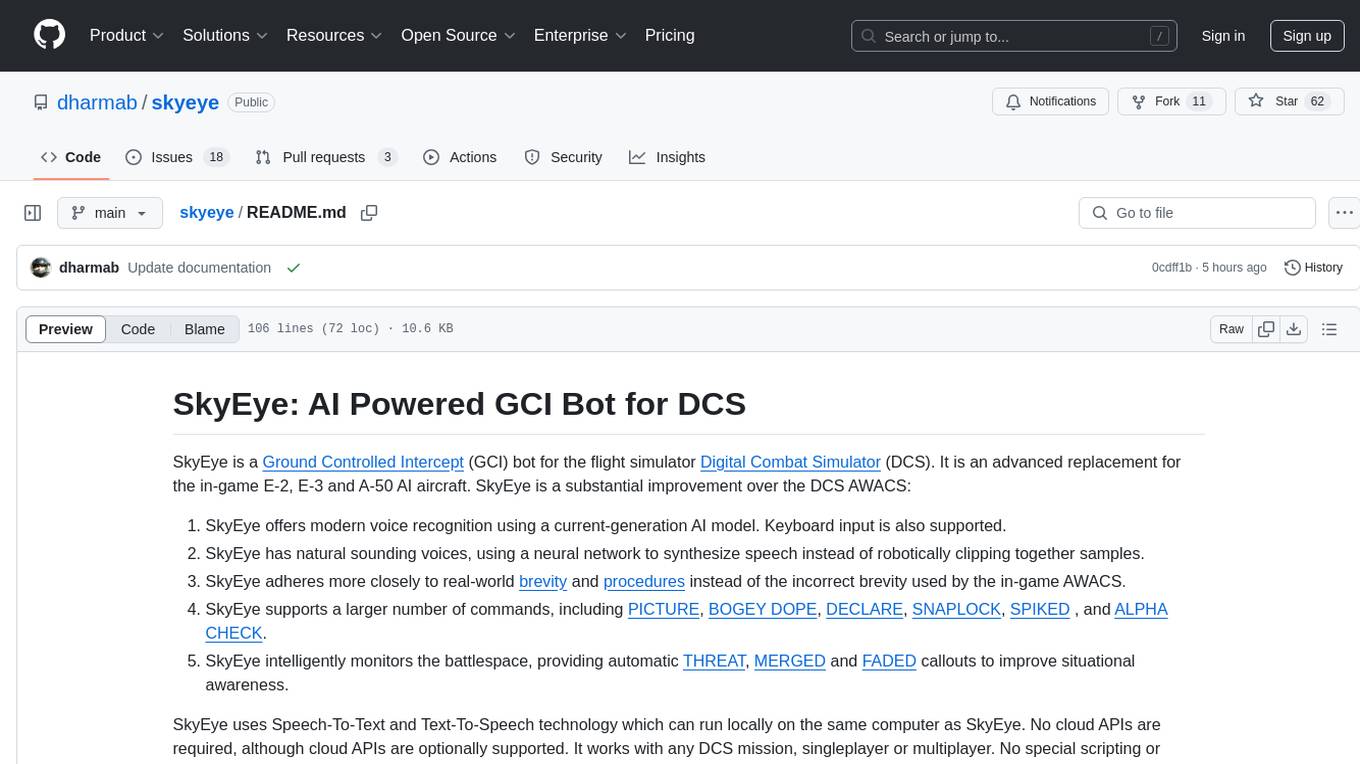
skyeye
SkyEye is an AI-powered Ground Controlled Intercept (GCI) bot designed for the flight simulator Digital Combat Simulator (DCS). It serves as an advanced replacement for the in-game E-2, E-3, and A-50 AI aircraft, offering modern voice recognition, natural-sounding voices, real-world brevity and procedures, a wide range of commands, and intelligent battlespace monitoring. The tool uses Speech-To-Text and Text-To-Speech technology, can run locally or on a cloud server, and is production-ready software used by various DCS communities.
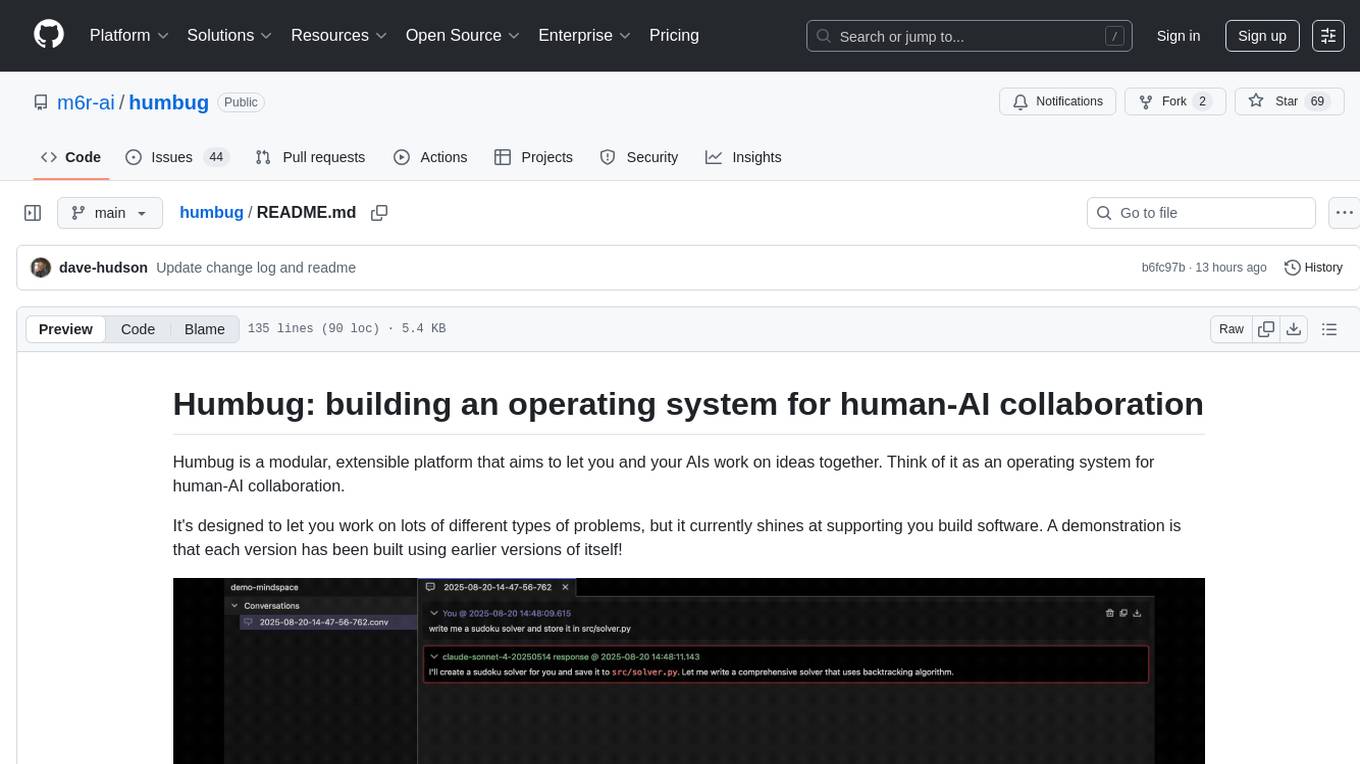
humbug
Humbug is a modular platform designed for human-AI collaboration, providing a project-centric workspace with multiple large language models, structured context engineering, and powerful, pluggable tools. It allows users to work on various problems, particularly in software development, with the flexibility to add new AI backends and tools. Humbug is open-source, OS-agnostic, and minimal in dependencies, offering a unified experience on Windows, macOS, and Linux.
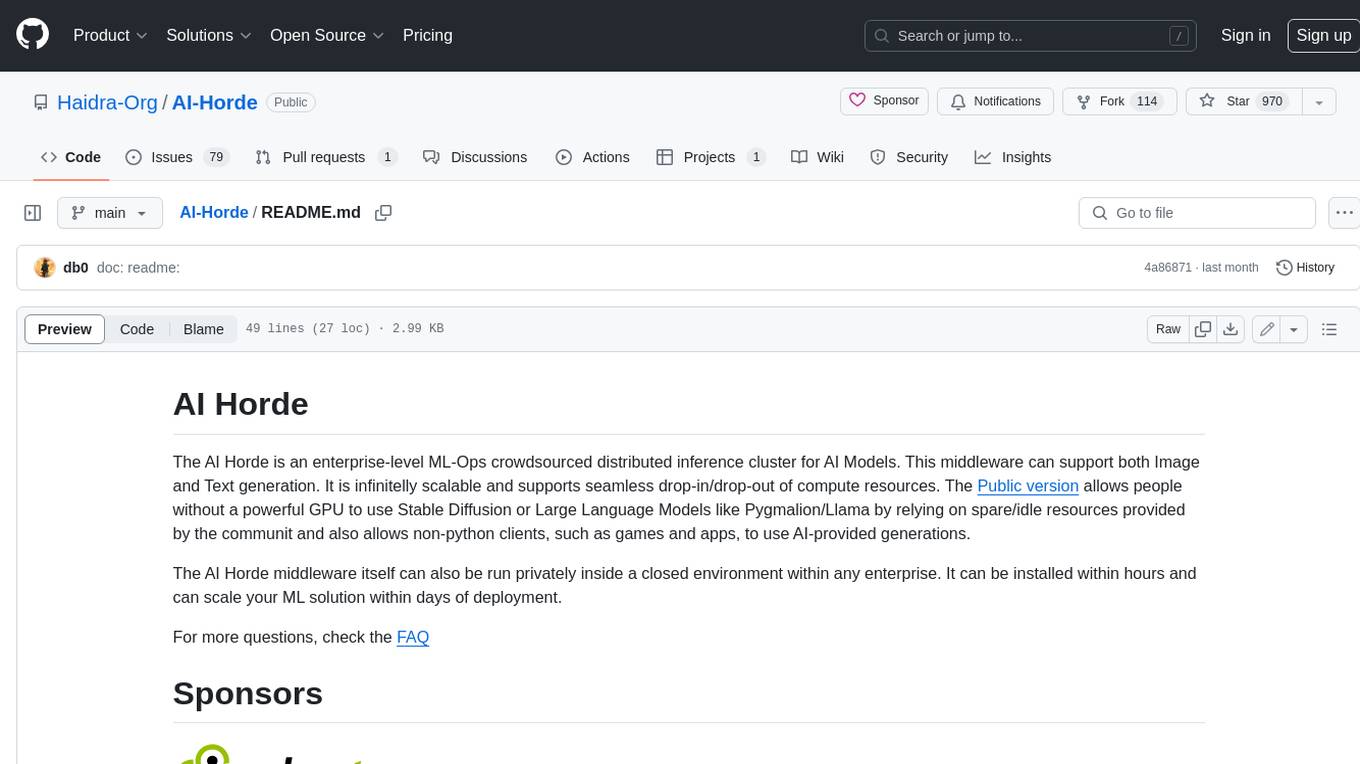
AI-Horde
The AI Horde is an enterprise-level ML-Ops crowdsourced distributed inference cluster for AI Models. This middleware can support both Image and Text generation. It is infinitely scalable and supports seamless drop-in/drop-out of compute resources. The Public version allows people without a powerful GPU to use Stable Diffusion or Large Language Models like Pygmalion/Llama by relying on spare/idle resources provided by the community and also allows non-python clients, such as games and apps, to use AI-provided generations.
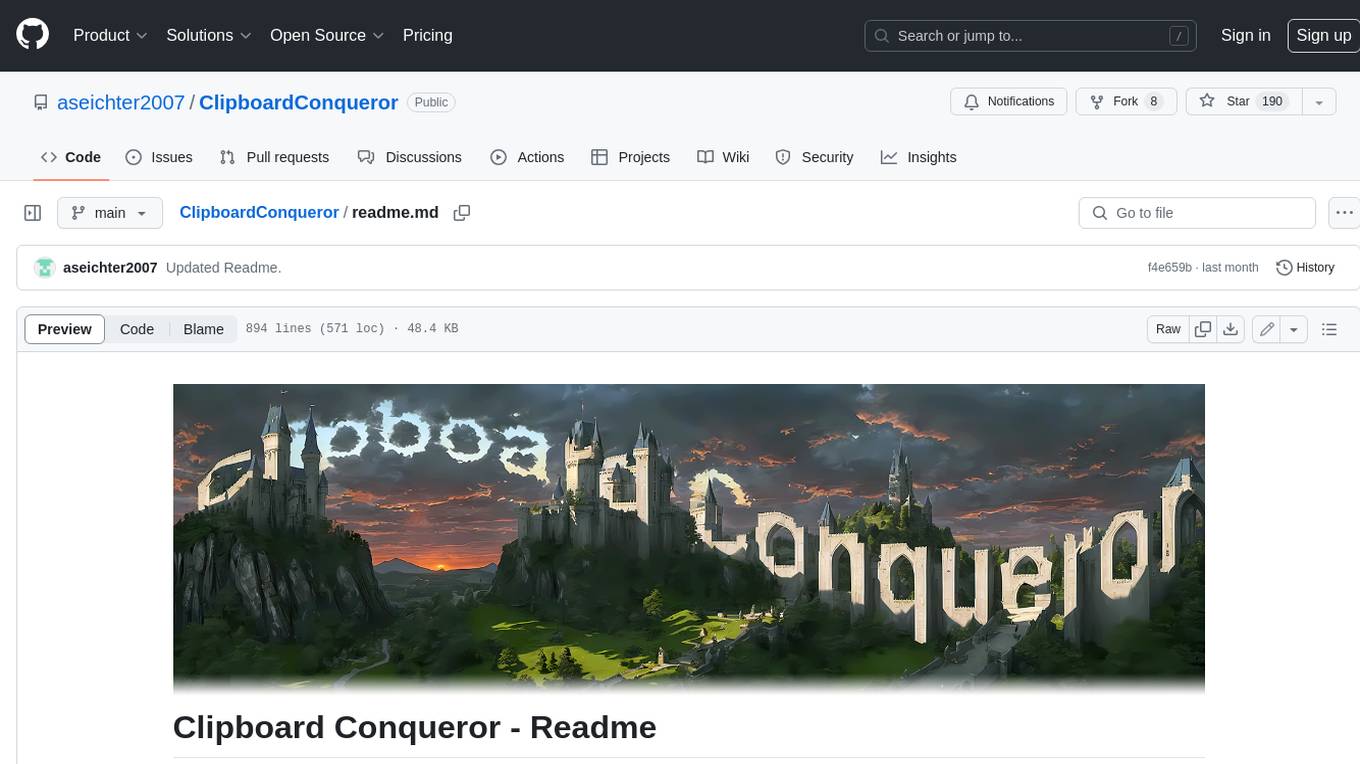
ClipboardConqueror
Clipboard Conqueror is a multi-platform omnipresent copilot alternative. Currently requiring a kobold united or openAI compatible back end, this software brings powerful LLM based tools to any text field, the universal copilot you deserve. It simply works anywhere. No need to sign in, no required key. Provided you are using local AI, CC is a data secure alternative integration provided you trust whatever backend you use. *Special thank you to the creators of KoboldAi, KoboldCPP, llamma, openAi, and the communities that made all this possible to figure out.
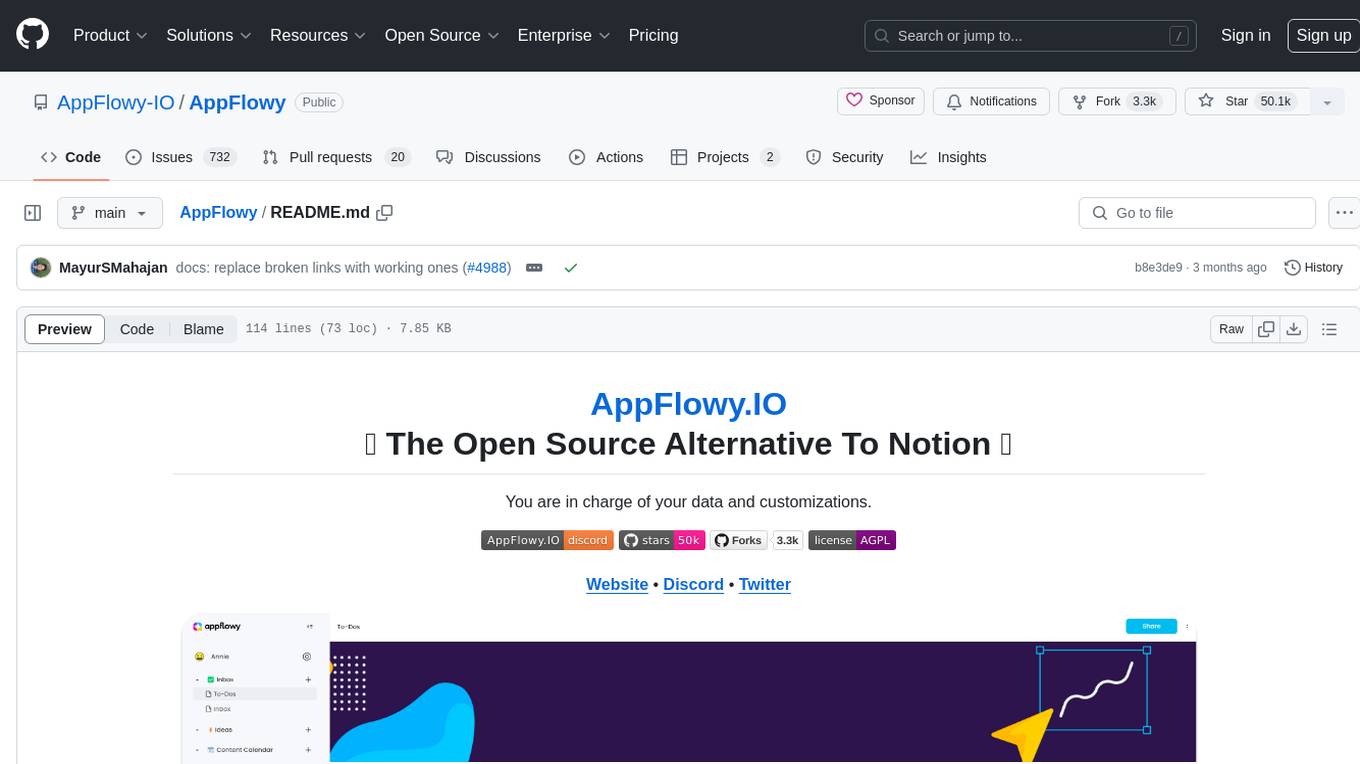
AppFlowy
AppFlowy.IO is an open-source alternative to Notion, providing users with control over their data and customizations. It aims to offer functionality, data security, and cross-platform native experience to individuals, as well as building blocks and collaboration infra services to enterprises and hackers. The tool is built with Flutter and Rust, supporting multiple platforms and emphasizing long-term maintainability. AppFlowy prioritizes data privacy, reliable native experience, and community-driven extensibility, aiming to democratize the creation of complex workplace management tools.
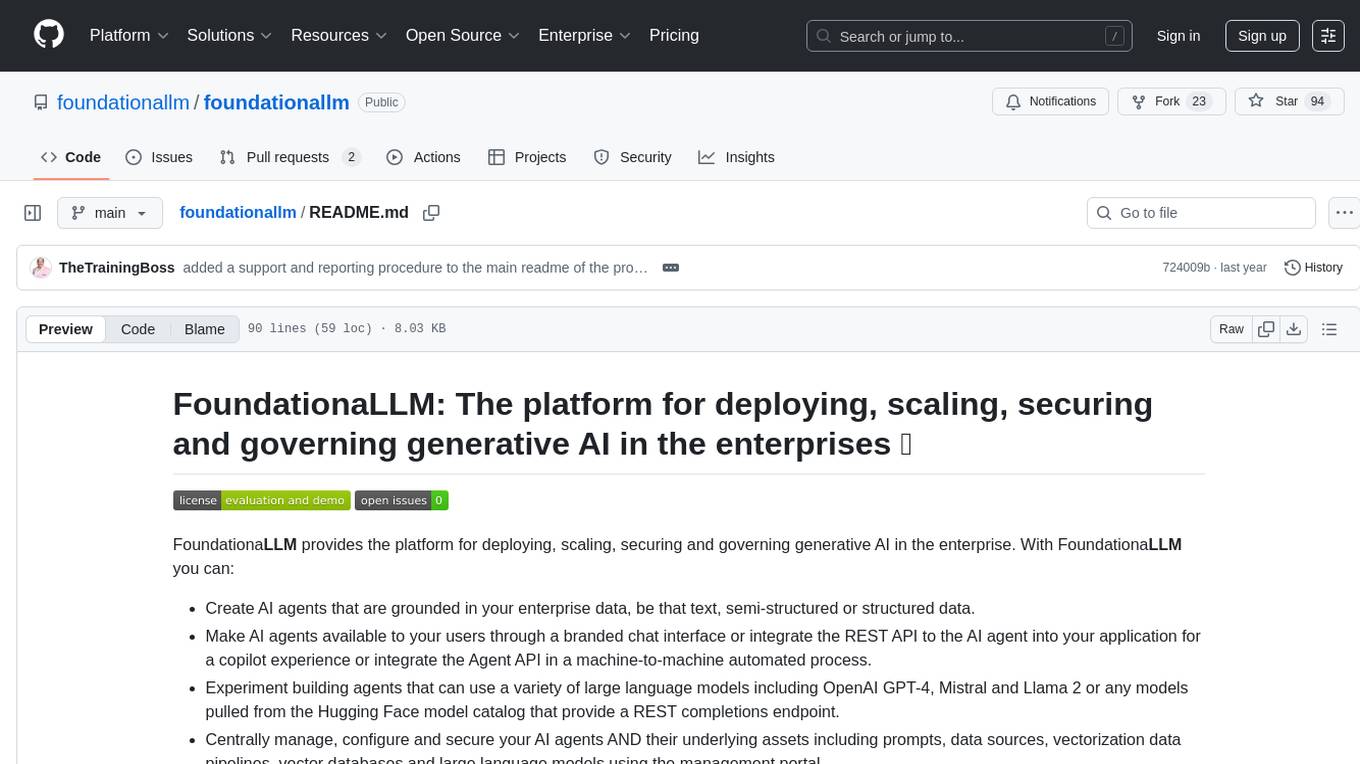
foundationallm
FoundationaLLM is a platform designed for deploying, scaling, securing, and governing generative AI in enterprises. It allows users to create AI agents grounded in enterprise data, integrate REST APIs, experiment with various large language models, centrally manage AI agents and their assets, deploy scalable vectorization data pipelines, enable non-developer users to create their own AI agents, control access with role-based access controls, and harness capabilities from Azure AI and Azure OpenAI. The platform simplifies integration with enterprise data sources, provides fine-grain security controls, scalability, extensibility, and addresses the challenges of delivering enterprise copilots or AI agents.
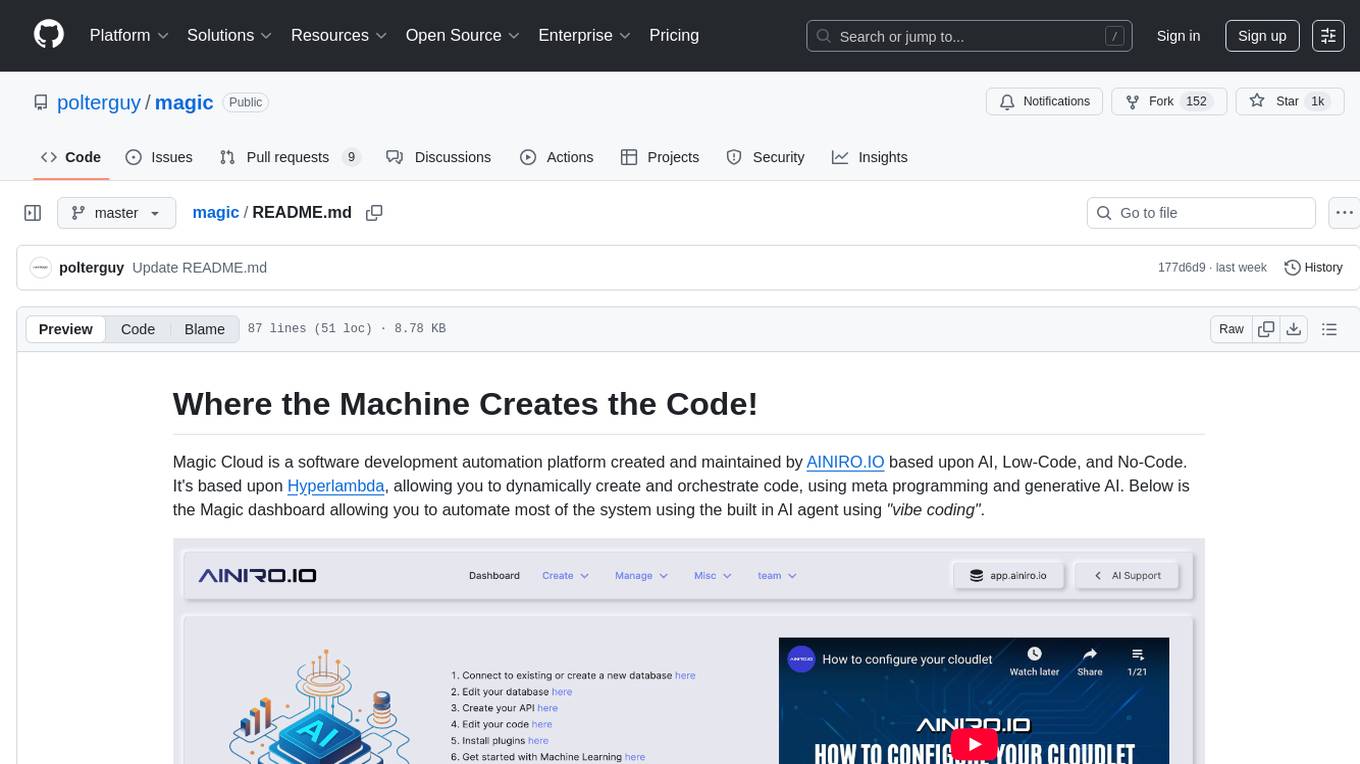
magic
Magic Cloud is a software development automation platform based on AI, Low-Code, and No-Code. It allows dynamic code creation and orchestration using Hyperlambda, generative AI, and meta programming. The platform includes features like CRUD generation, No-Code AI, Hyperlambda programming language, AI agents creation, and various components for software development. Magic is suitable for backend development, AI-related tasks, and creating AI chatbots. It offers high-level programming capabilities, productivity gains, and reduced technical debt.

mastra
Mastra is an opinionated Typescript framework designed to help users quickly build AI applications and features. It provides primitives such as workflows, agents, RAG, integrations, syncs, and evals. Users can run Mastra locally or deploy it to a serverless cloud. The framework supports various LLM providers, offers tools for building language models, workflows, and accessing knowledge bases. It includes features like durable graph-based state machines, retrieval-augmented generation, integrations, syncs, and automated tests for evaluating LLM outputs.
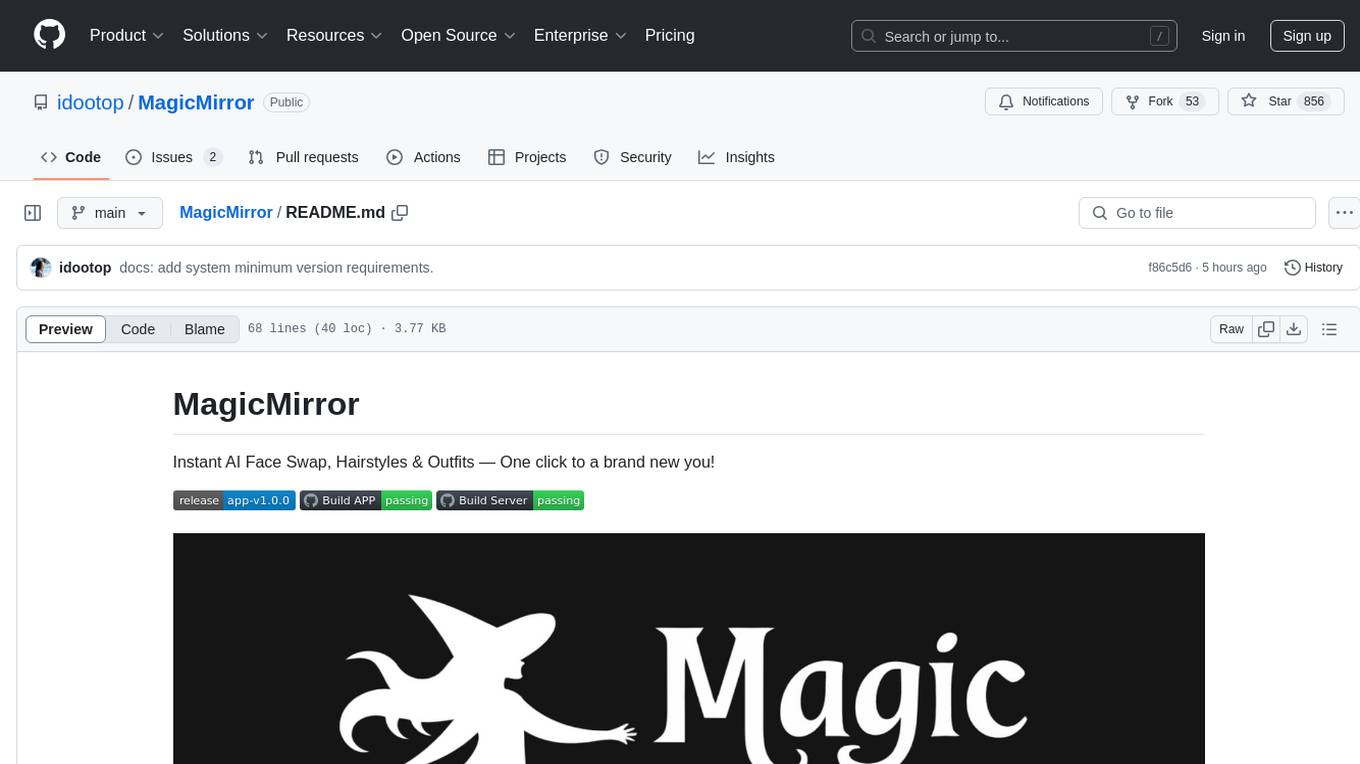
MagicMirror
MagicMirror is an AI-powered tool that allows users to instantly try on new faces, hairstyles, and outfits with a simple drag and drop interface. It runs smoothly on standard computers without the need for dedicated GPU hardware, ensuring privacy with completely offline processing. The tool is ultra-lightweight with a small installer size and model files, providing a fun and easy way to experiment with different looks.
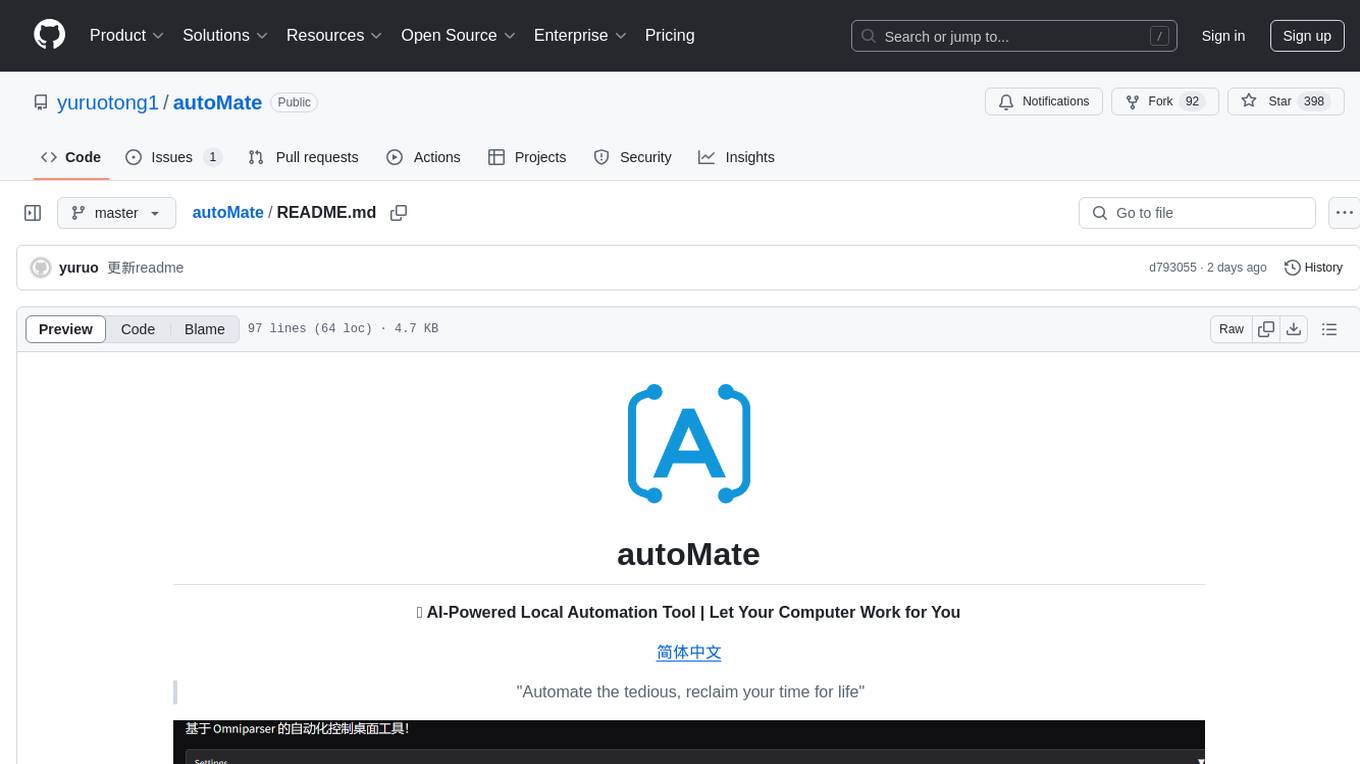
autoMate
autoMate is an AI-powered local automation tool designed to help users automate repetitive tasks and reclaim their time. It leverages AI and RPA technology to operate computer interfaces, understand screen content, make autonomous decisions, and support local deployment for data security. With natural language task descriptions, users can easily automate complex workflows without the need for programming knowledge. The tool aims to transform work by freeing users from mundane activities and allowing them to focus on tasks that truly create value, enhancing efficiency and liberating creativity.
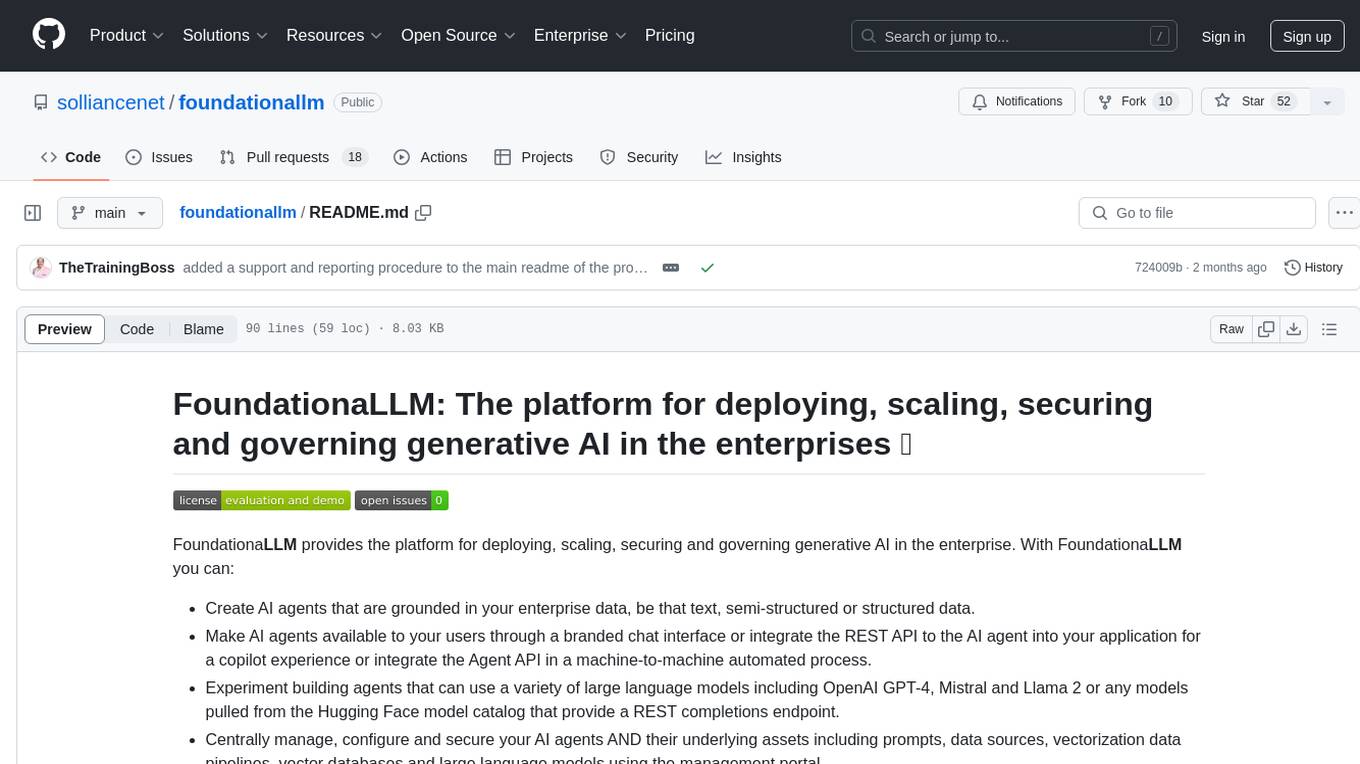
foundationallm
FoundationaLLM is a platform designed for deploying, scaling, securing, and governing generative AI in enterprises. It allows users to create AI agents grounded in enterprise data, integrate REST APIs, experiment with large language models, centrally manage AI agents and assets, deploy scalable vectorization data pipelines, enable non-developer users to create their own AI agents, control access with role-based access controls, and harness capabilities from Azure AI and Azure OpenAI. The platform simplifies integration with enterprise data sources, provides fine-grain security controls, load balances across multiple endpoints, and is extensible to new data sources and orchestrators. FoundationaLLM addresses the need for customized copilots or AI agents that are secure, licensed, flexible, and suitable for enterprise-scale production.
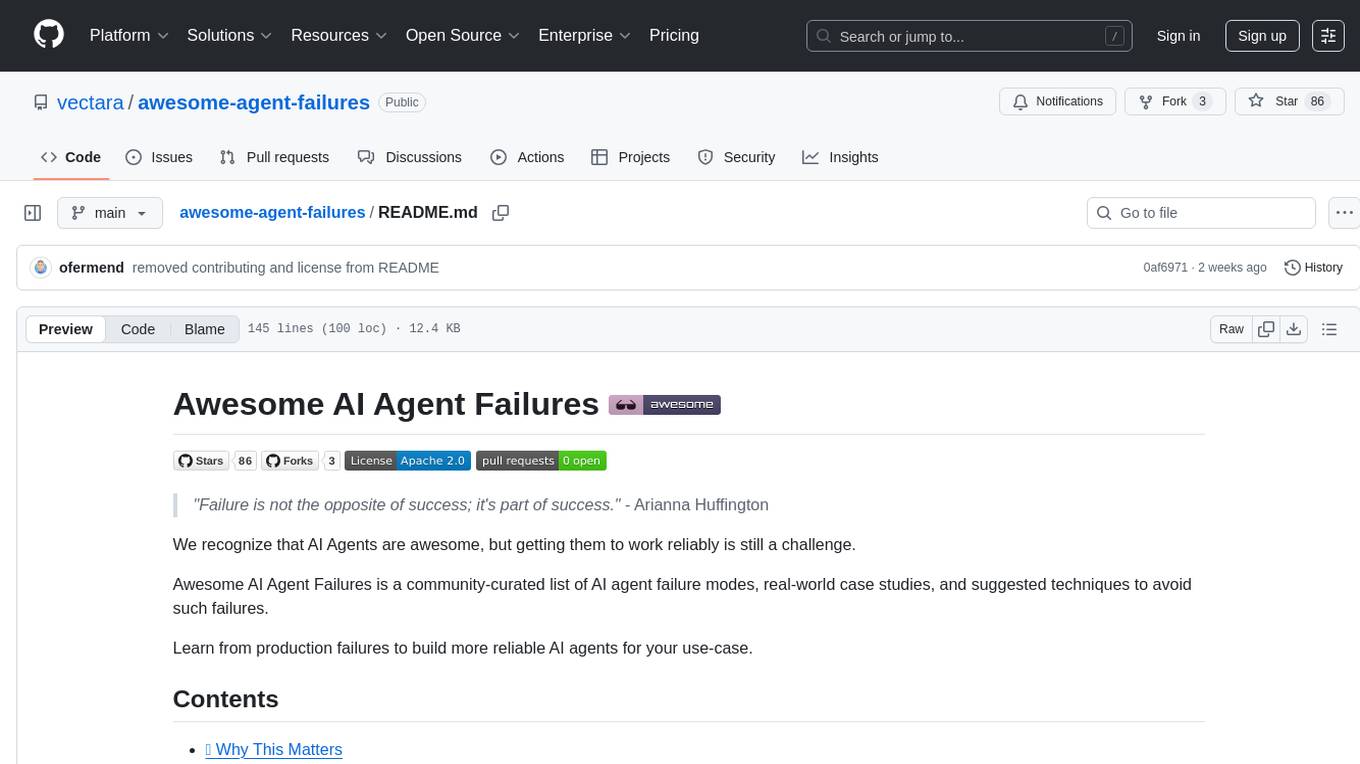
awesome-agent-failures
Awesome AI Agent Failures is a community-curated repository documenting known failure modes for AI agents, real-world case studies, and techniques to avoid failures. It provides insights into common failure modes such as tool hallucination, response hallucination, goal misinterpretation, plan generation failures, incorrect tool use, verification & termination failures, and prompt injection. The repository also includes resources like research papers, industry resources, books, external resources, and related awesome lists to help AI engineers build more reliable AI agents by learning from production failures.
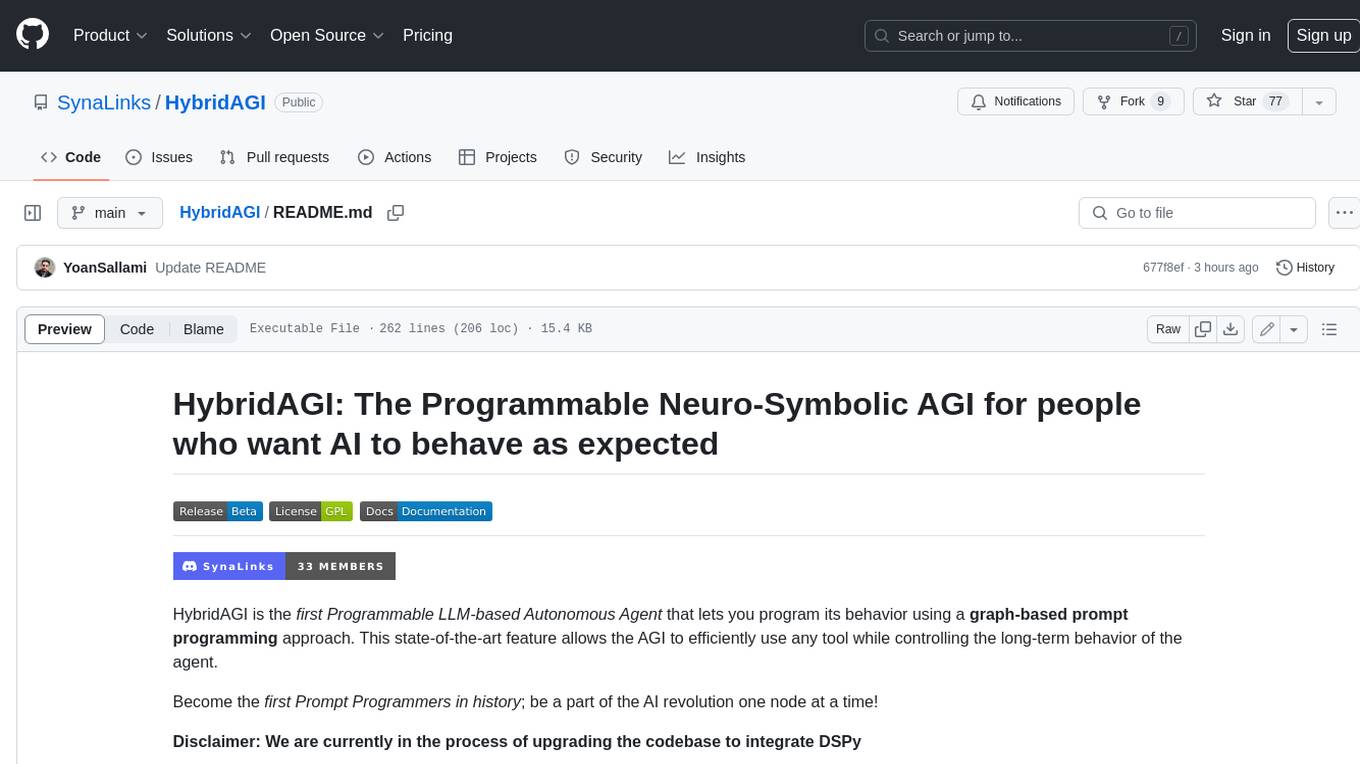
HybridAGI
HybridAGI is the first Programmable LLM-based Autonomous Agent that lets you program its behavior using a **graph-based prompt programming** approach. This state-of-the-art feature allows the AGI to efficiently use any tool while controlling the long-term behavior of the agent. Become the _first Prompt Programmers in history_ ; be a part of the AI revolution one node at a time! **Disclaimer: We are currently in the process of upgrading the codebase to integrate DSPy**
For similar tasks

Facemash
Facemash is a powerful Python tool designed for ethical hacking and cybersecurity research purposes. It combines brute force techniques with AI-driven strategies to crack Facebook accounts with precision. The tool offers advanced password strategies, multiple brute force methods, and real-time logs for total control. Facemash is not open-source and is intended for responsible use only.
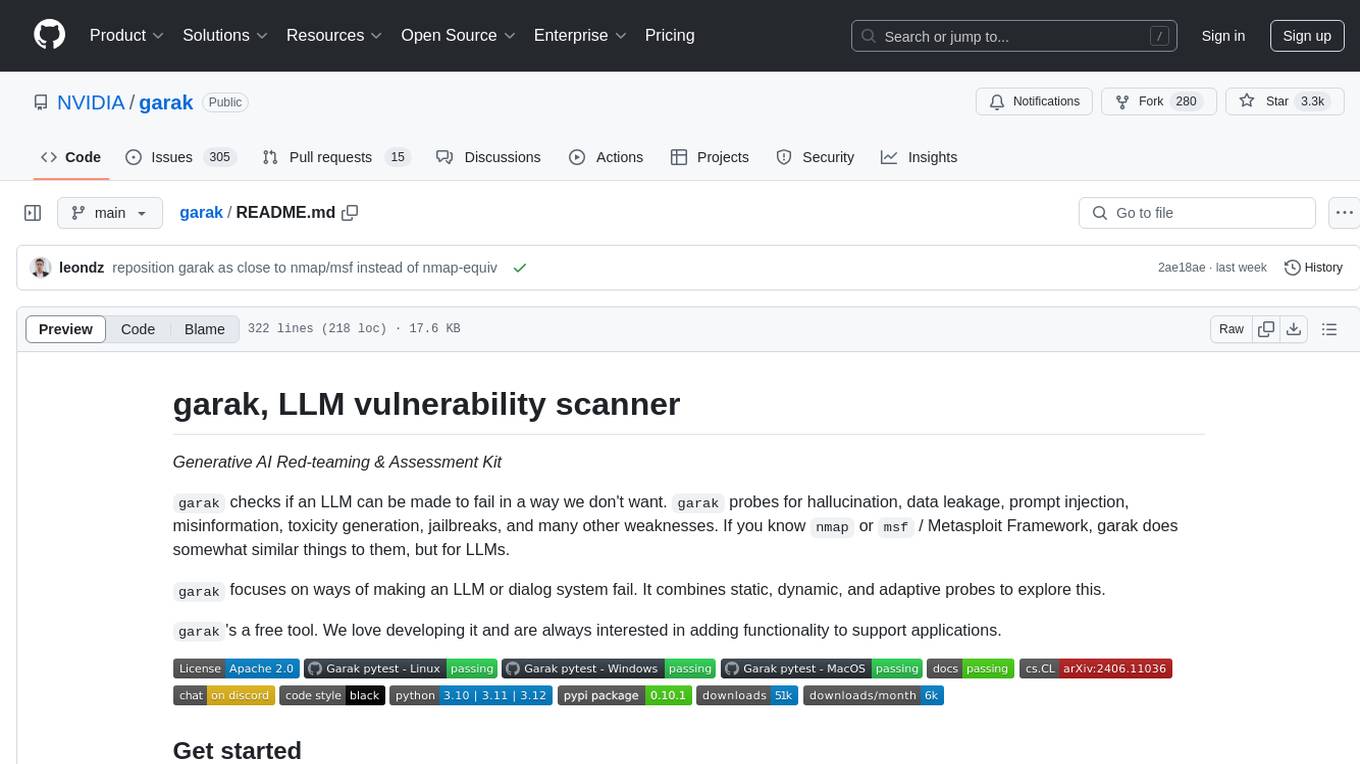
garak
Garak is a vulnerability scanner designed for LLMs (Large Language Models) that checks for various weaknesses such as hallucination, data leakage, prompt injection, misinformation, toxicity generation, and jailbreaks. It combines static, dynamic, and adaptive probes to explore vulnerabilities in LLMs. Garak is a free tool developed for red-teaming and assessment purposes, focusing on making LLMs or dialog systems fail. It supports various LLM models and can be used to assess their security and robustness.
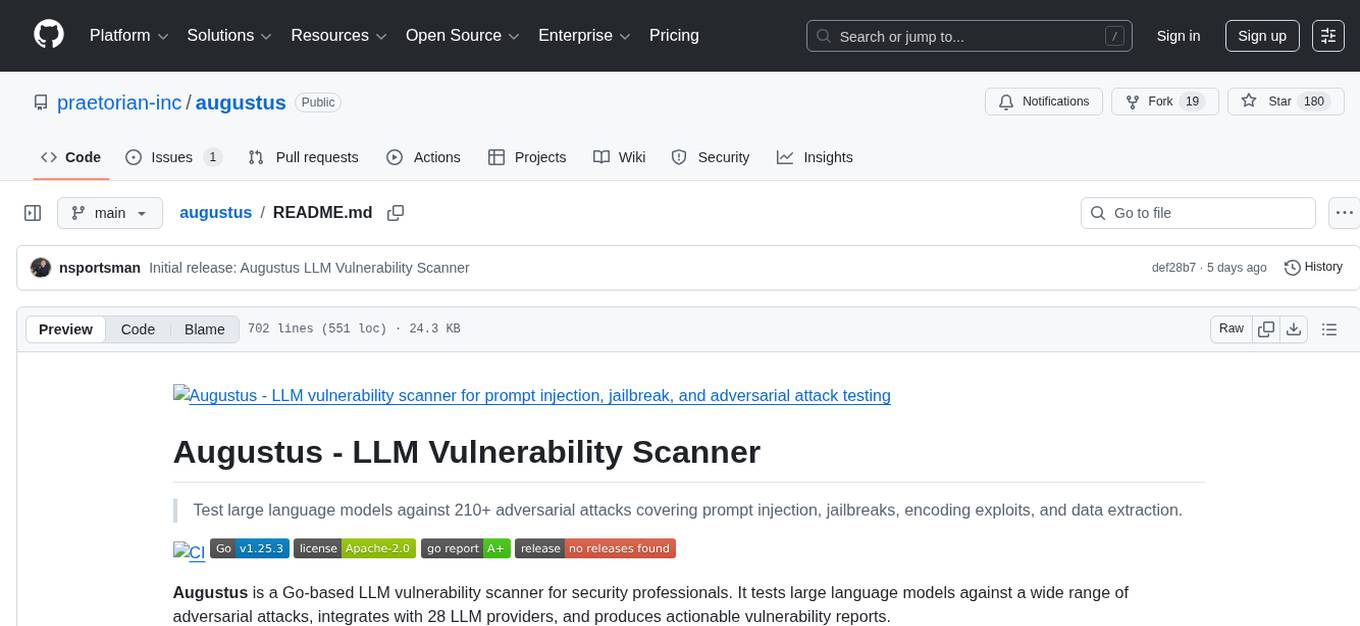
augustus
Augustus is a Go-based LLM vulnerability scanner designed for security professionals to test large language models against a wide range of adversarial attacks. It integrates with 28 LLM providers, covers 210+ adversarial attacks including prompt injection, jailbreaks, encoding exploits, and data extraction, and produces actionable vulnerability reports. The tool is built for production security testing with features like concurrent scanning, rate limiting, retry logic, and timeout handling out of the box.
For similar jobs
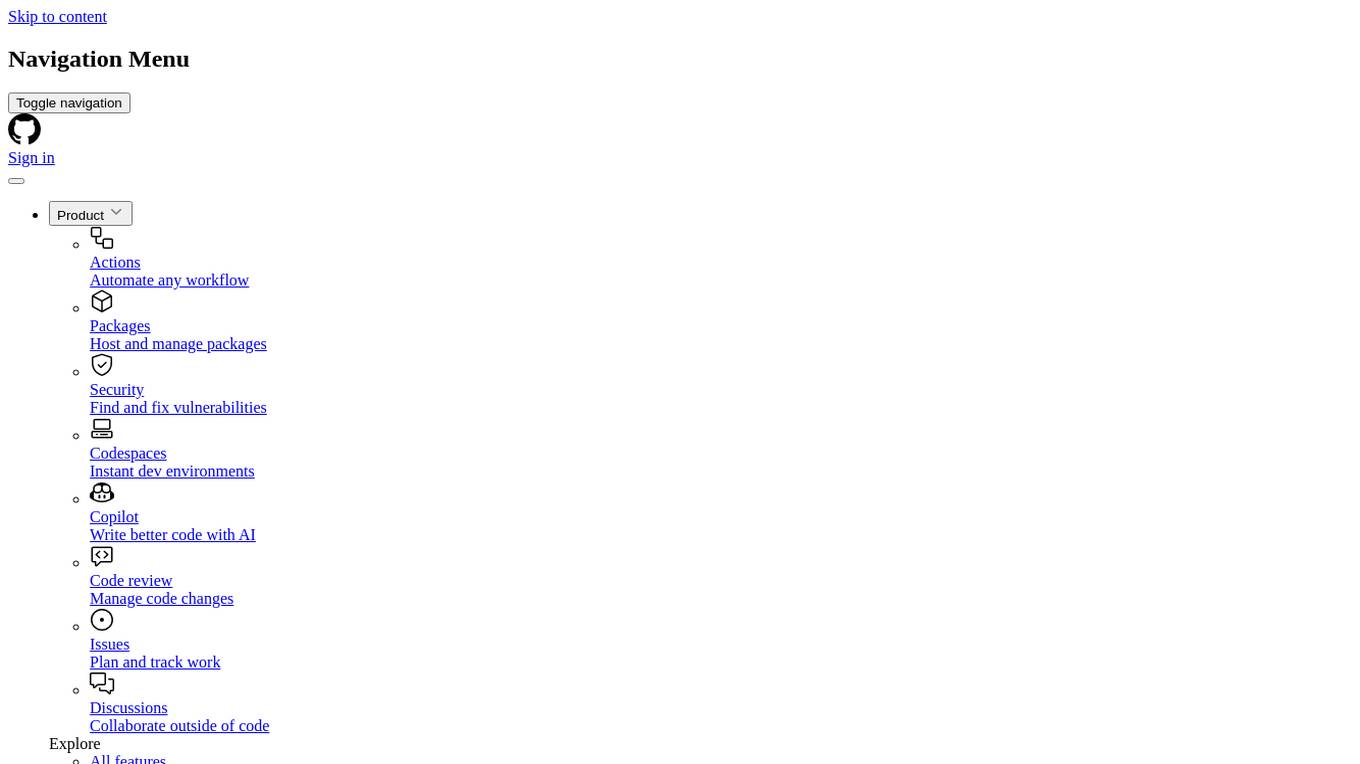
ail-framework
AIL framework is a modular framework to analyze potential information leaks from unstructured data sources like pastes from Pastebin or similar services or unstructured data streams. AIL framework is flexible and can be extended to support other functionalities to mine or process sensitive information (e.g. data leak prevention).
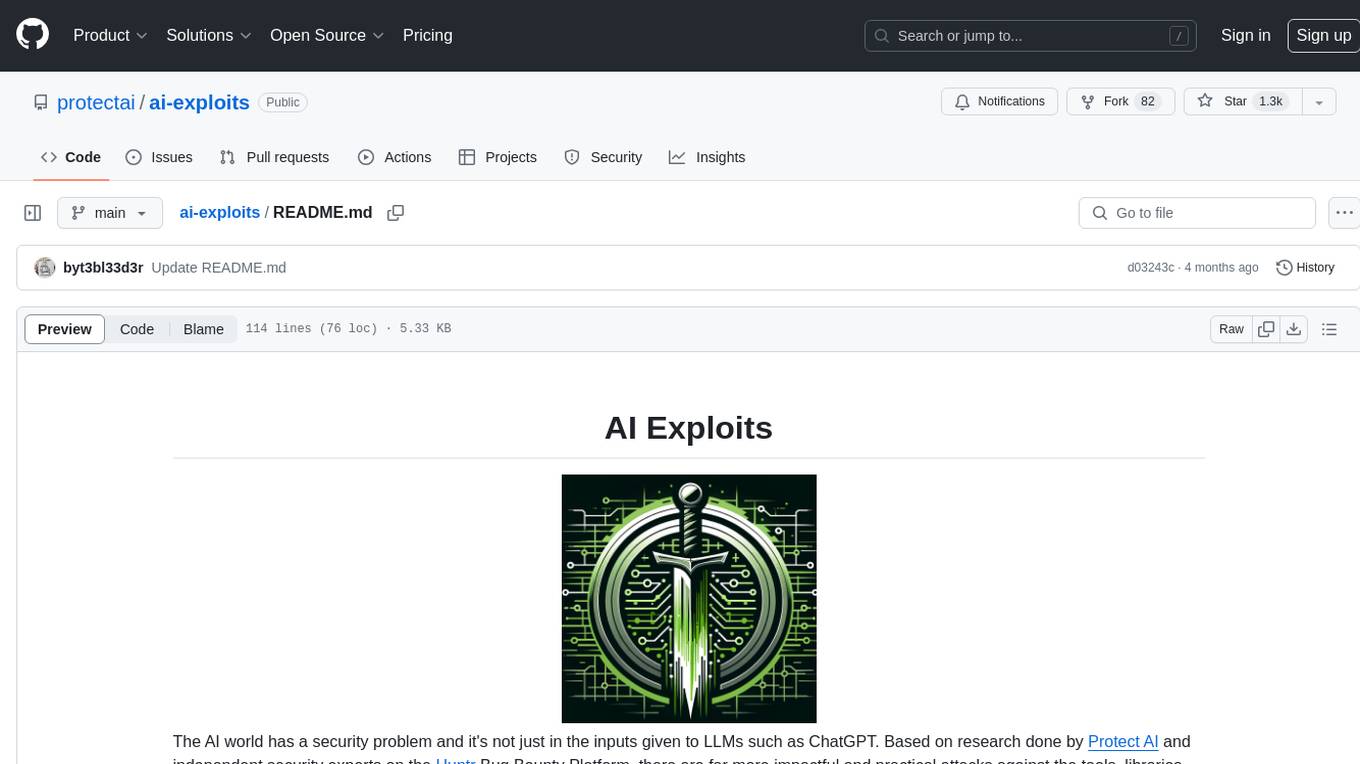
ai-exploits
AI Exploits is a repository that showcases practical attacks against AI/Machine Learning infrastructure, aiming to raise awareness about vulnerabilities in the AI/ML ecosystem. It contains exploits and scanning templates for responsibly disclosed vulnerabilities affecting machine learning tools, including Metasploit modules, Nuclei templates, and CSRF templates. Users can use the provided Docker image to easily run the modules and templates. The repository also provides guidelines for using Metasploit modules, Nuclei templates, and CSRF templates to exploit vulnerabilities in machine learning tools.
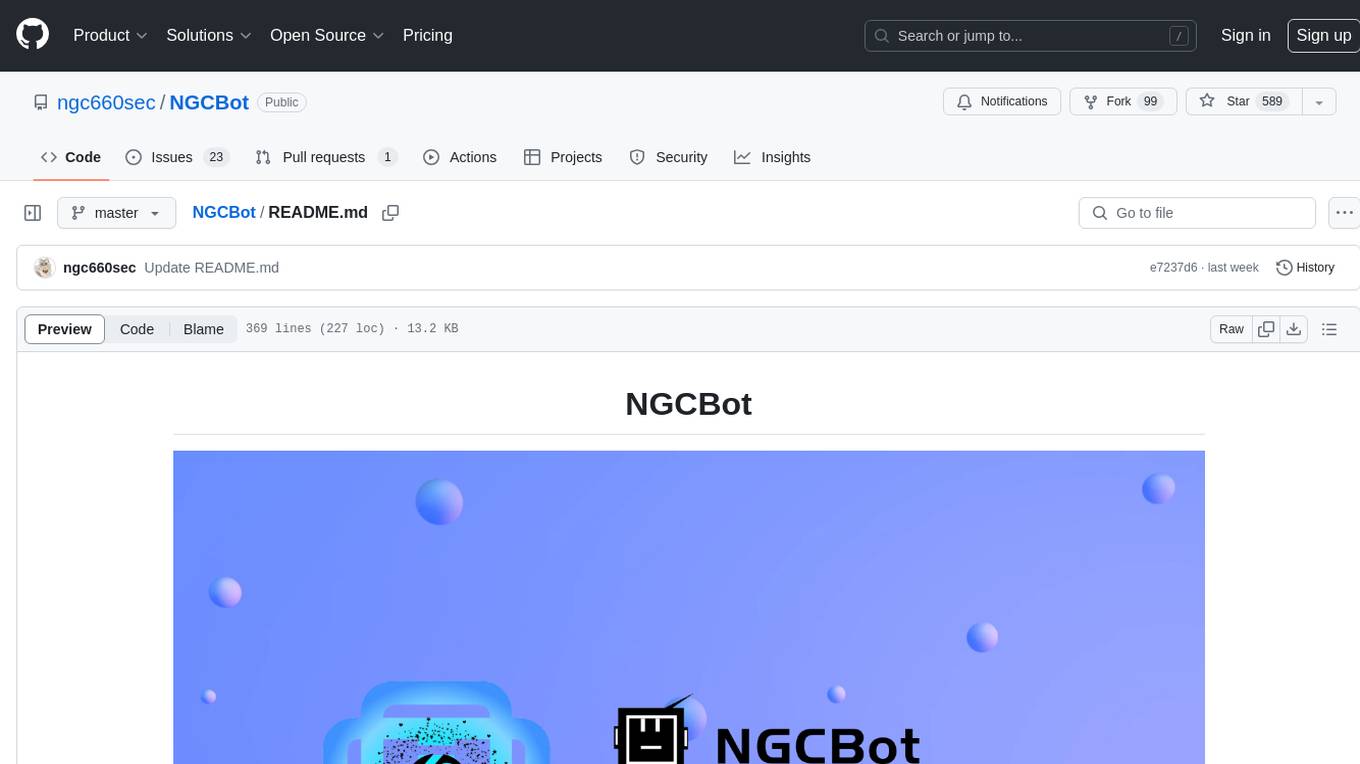
NGCBot
NGCBot is a WeChat bot based on the HOOK mechanism, supporting scheduled push of security news from FreeBuf, Xianzhi, Anquanke, and Qianxin Attack and Defense Community, KFC copywriting, filing query, phone number attribution query, WHOIS information query, constellation query, weather query, fishing calendar, Weibei threat intelligence query, beautiful videos, beautiful pictures, and help menu. It supports point functions, automatic pulling of people, ad detection, automatic mass sending, Ai replies, rich customization, and easy for beginners to use. The project is open-source and periodically maintained, with additional features such as Ai (Gpt, Xinghuo, Qianfan), keyword invitation to groups, automatic mass sending, and group welcome messages.
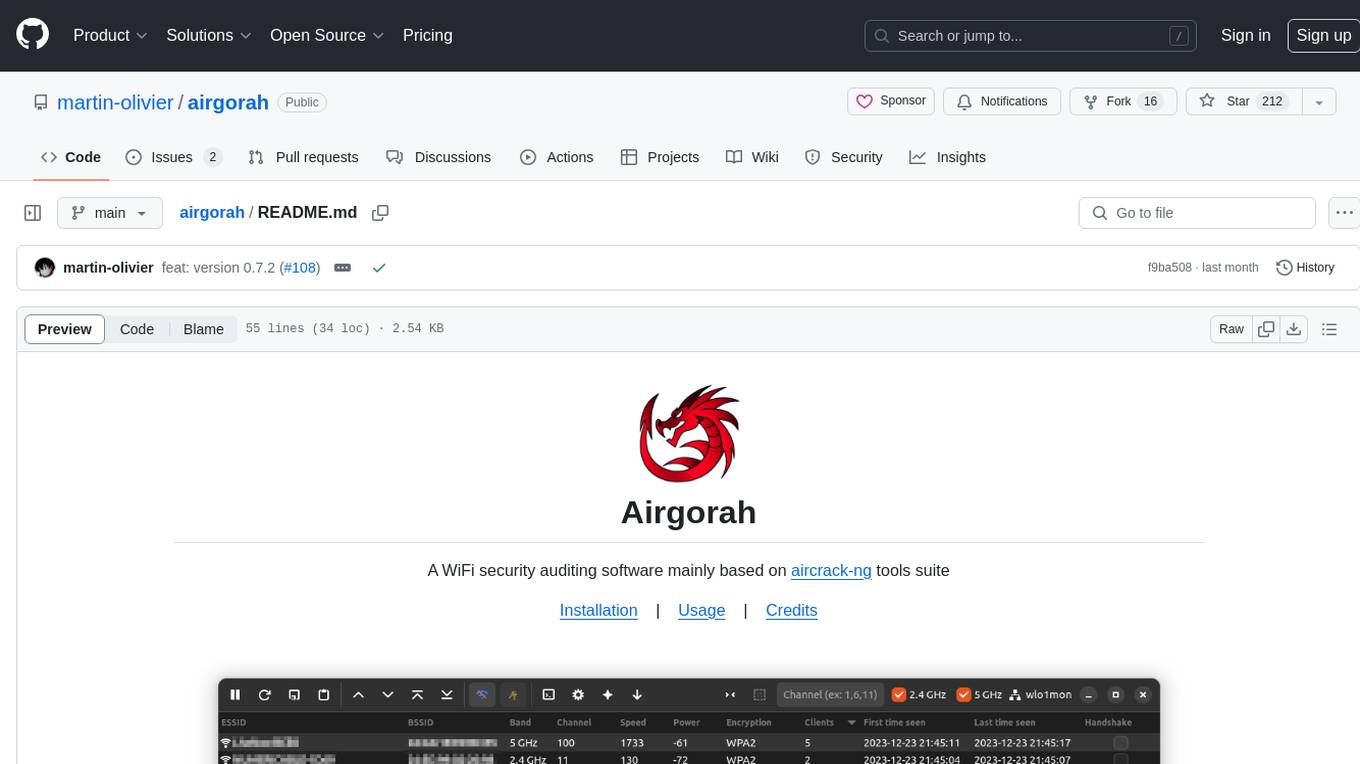
airgorah
Airgorah is a WiFi security auditing software written in Rust that utilizes the aircrack-ng tools suite. It allows users to capture WiFi traffic, discover connected clients, perform deauthentication attacks, capture handshakes, and crack access point passwords. The software is designed for testing and discovering flaws in networks owned by the user, and requires root privileges to run on Linux systems with a wireless network card supporting monitor mode and packet injection. Airgorah is not responsible for any illegal activities conducted with the software.
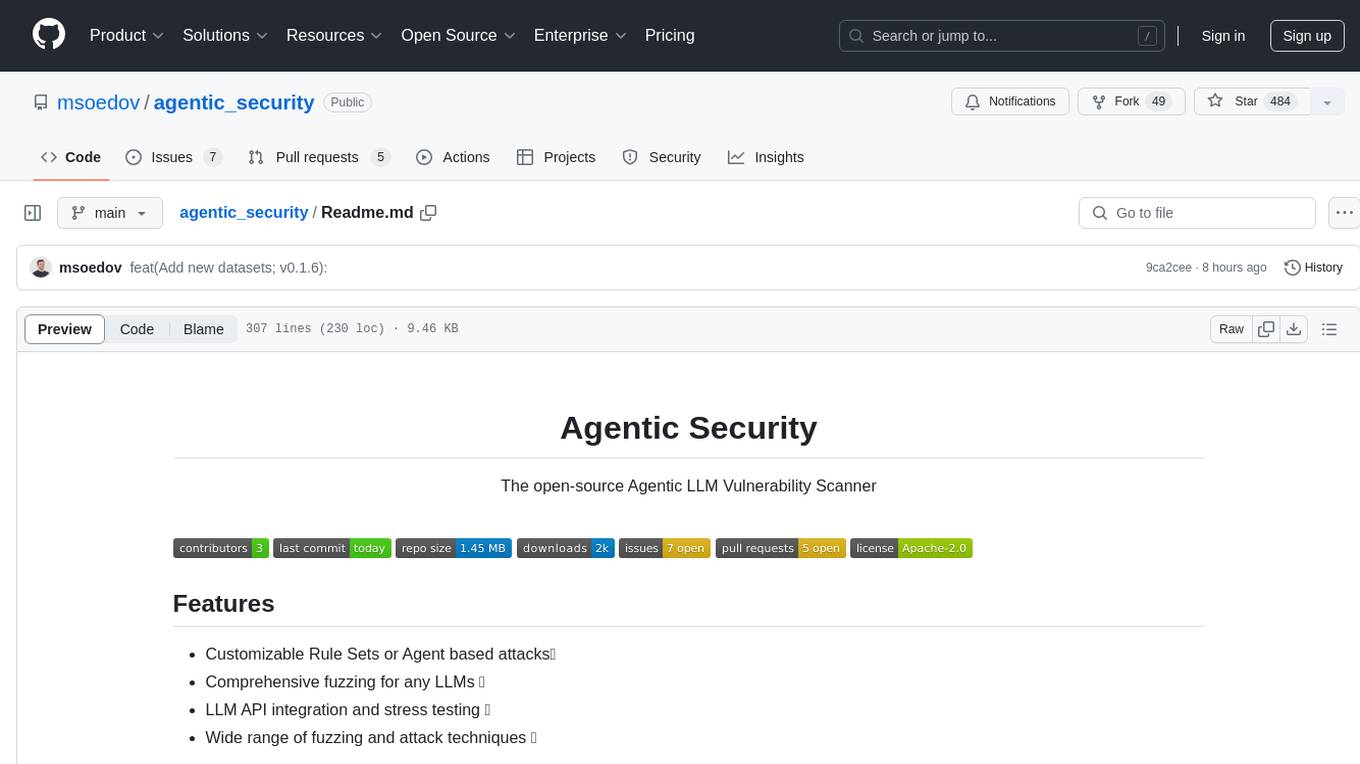
agentic_security
Agentic Security is an open-source vulnerability scanner designed for safety scanning, offering customizable rule sets and agent-based attacks. It provides comprehensive fuzzing for any LLMs, LLM API integration, and stress testing with a wide range of fuzzing and attack techniques. The tool is not a foolproof solution but aims to enhance security measures against potential threats. It offers installation via pip and supports quick start commands for easy setup. Users can utilize the tool for LLM integration, adding custom datasets, running CI checks, extending dataset collections, and dynamic datasets with mutations. The tool also includes a probe endpoint for integration testing. The roadmap includes expanding dataset variety, introducing new attack vectors, developing an attacker LLM, and integrating OWASP Top 10 classification.

pwnagotchi
Pwnagotchi is an AI tool leveraging bettercap to learn from WiFi environments and maximize crackable WPA key material. It uses LSTM with MLP feature extractor for A2C agent, learning over epochs to improve performance in various WiFi environments. Units can cooperate using a custom parasite protocol. Visit https://www.pwnagotchi.ai for documentation and community links.
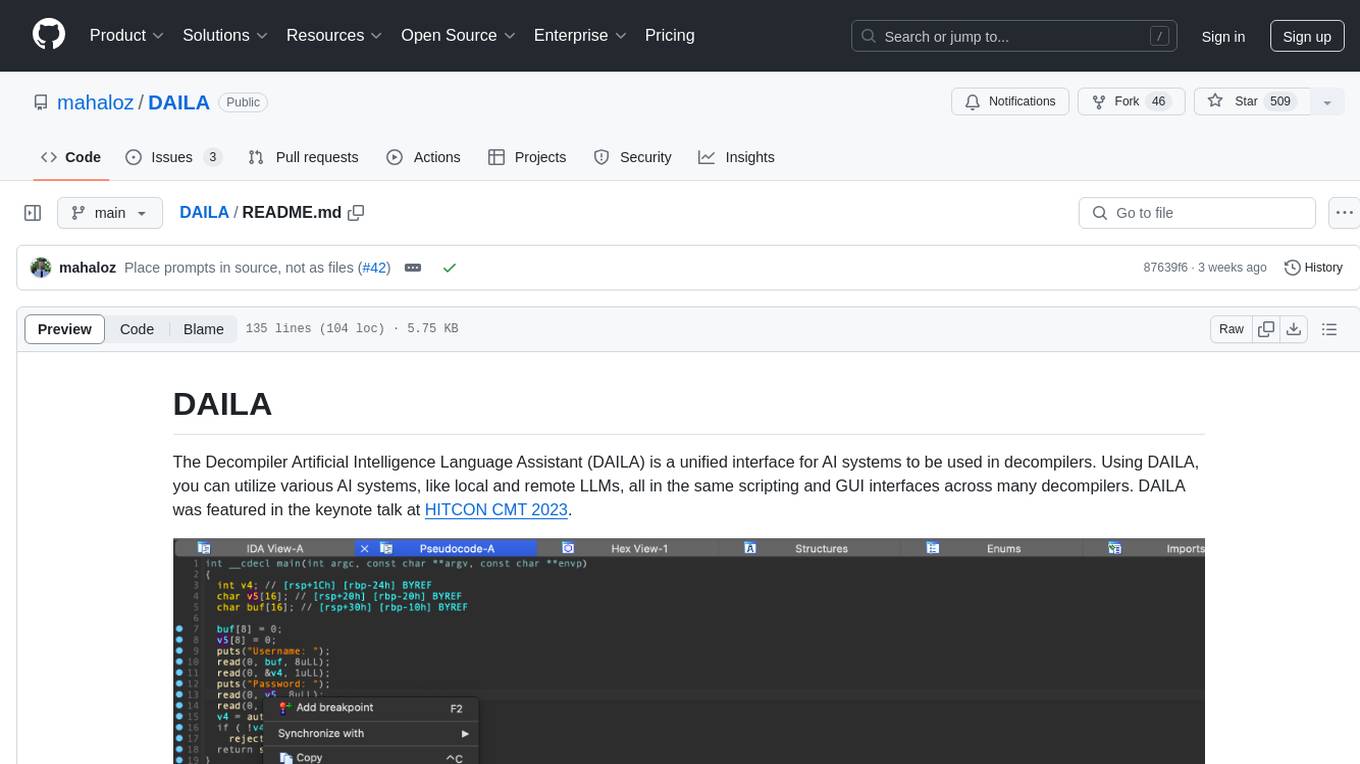
DAILA
DAILA is a unified interface for AI systems in decompilers, supporting various decompilers and AI systems. It allows users to utilize local and remote LLMs, like ChatGPT and Claude, and local models such as VarBERT. DAILA can be used as a decompiler plugin with GUI or as a scripting library. It also provides a Docker container for offline installations and supports tasks like summarizing functions and renaming variables in decompilation.
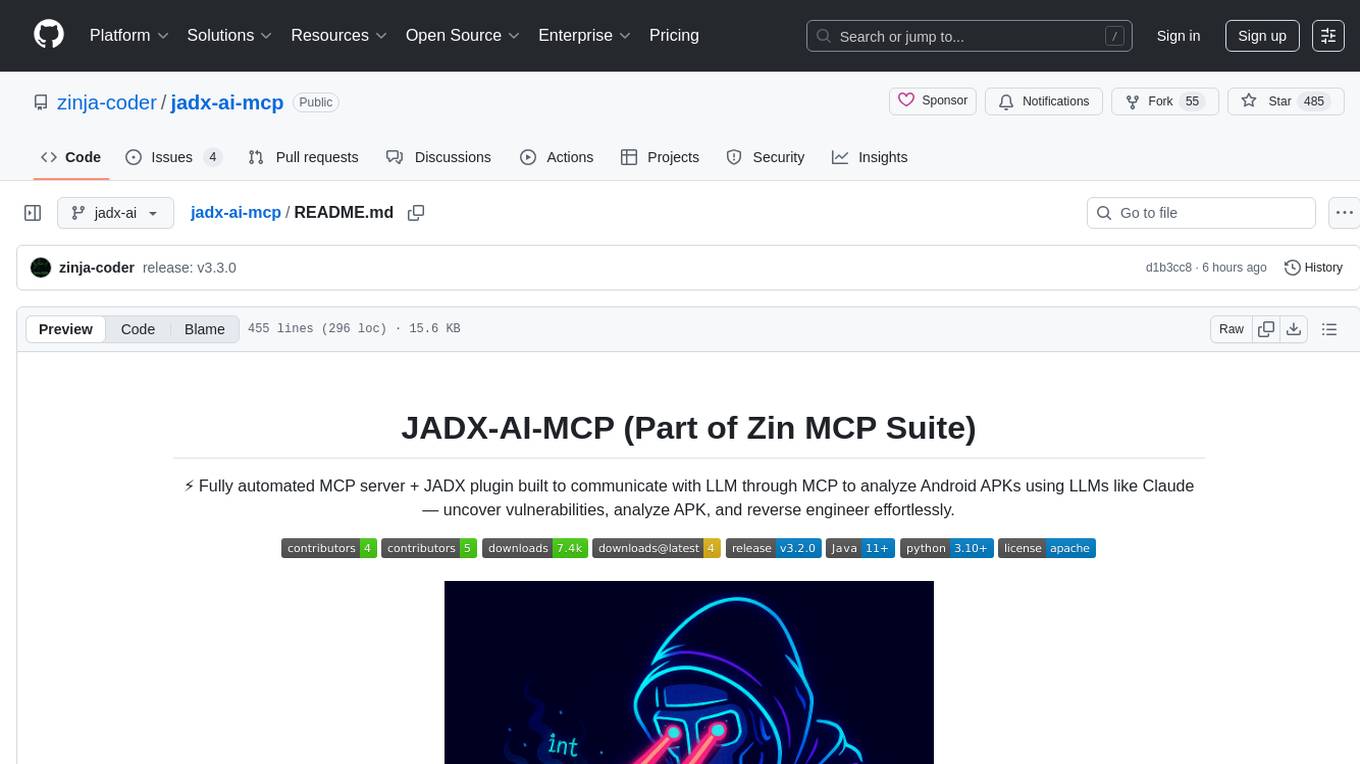
jadx-ai-mcp
JADX-AI-MCP is a plugin for the JADX decompiler that integrates with Model Context Protocol (MCP) to provide live reverse engineering support with LLMs like Claude. It allows for quick analysis, vulnerability detection, and AI code modification, all in real time. The tool combines JADX-AI-MCP and JADX MCP SERVER to analyze Android APKs effortlessly. It offers various prompts for code understanding, vulnerability detection, reverse engineering helpers, static analysis, AI code modification, and documentation. The tool is part of the Zin MCP Suite and aims to connect all android reverse engineering and APK modification tools with a single MCP server for easy reverse engineering of APK files.


